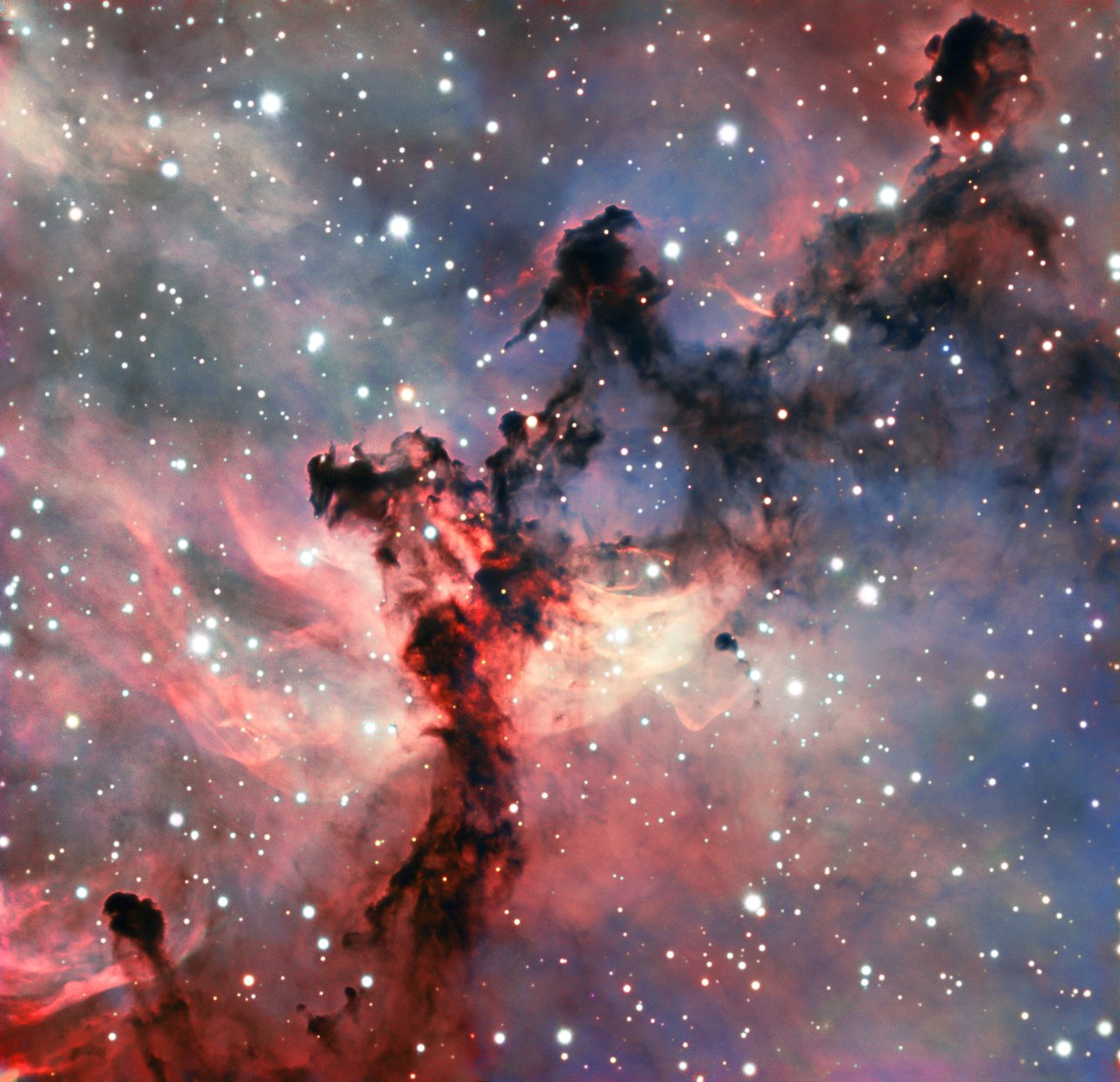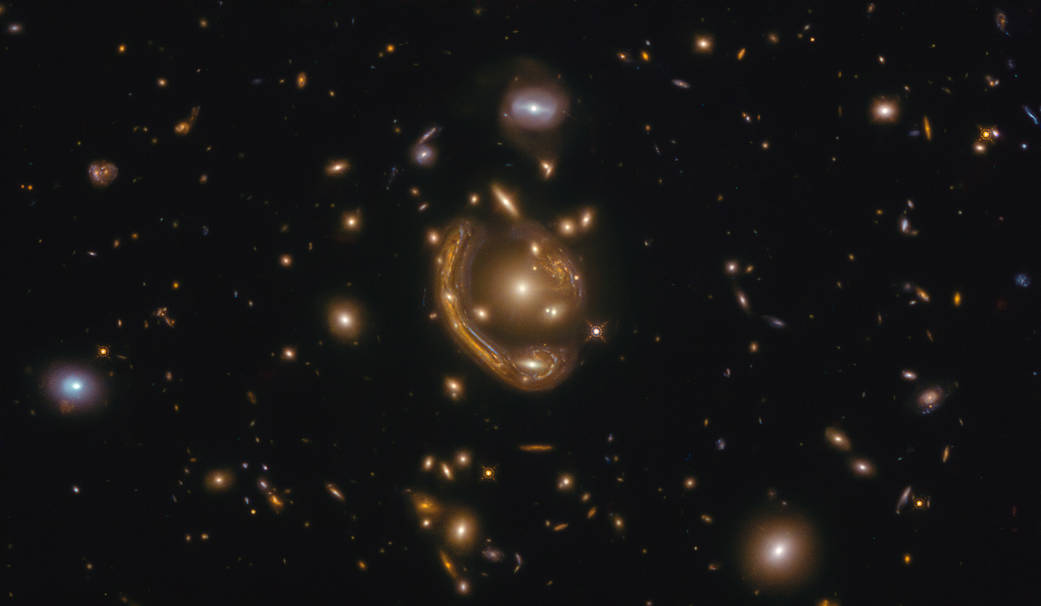Blog
This colourful image shows a part of the Rosette Nebula in the constellation of Monoceros (The Unicorn). It is an emission nebula, composed of clouds of gas that are made to glow by the radiation emanating from stars within. The Rosette Nebula is a fairly typical example of an emission nebula — but typical does not mean boring! Nebulae are some of the most beautiful celestial objects out there, and they frequently show up spectacularly in images taken by astronomical telescopes, as seen here. In nebulae such as this, gas and dust are combining to produce a new generation of stars. Initially these newly-formed stars are shrouded in the dusty clouds that gave them birth, and cannot be seen in visible light. But after a while they blow away the denser material and their powerful radiation pours out to ionise the surrounding gas, causing it to glow brightly. These elements are all present in this image — the mixture of glowing gas and dark dust has been sculpted into complex patterns on the sky by the stellar radiation, like smoke around a fire. This particular image was obtained with the FORS 2 instrument on ESO’s Very Large Telescope, sited in the harsh environment of Chile’s Atacama Desert. FORS 2 is an extremely versatile instrument that can produce very high-quality images (like this one!). It is also a spectrograph that can split the light it collects into a rainbow of colours, giving astronomers information about the chemical composition of objects across the Universe. This image was created as part of the ESO Cosmic Gems programme, an outreach initiative to produce images of interesting, intriguing or visually attractive objects using ESO telescopes, for the purposes of education and public outreach. The programme makes use of telescope time that cannot be used for science observations. All data collected may also be suitable for scientific purposes, and are made available to astronomers through ESO’s science archive.

Don Van Vliet (/væn ˈvliːt/, born Don Glen Vliet; January 15, 1941 – December 17, 2010) was an American singer, songwriter, multi-instrumentalist, and visual artist best known by the stage name Captain Beefheart. He conducted a rotating ensemble called the Magic Band, with whom he recorded 13 studio albums between 1964 and 1982. His music blended elements of blues, free jazz, rock, and avant-garde composition with idiosyncratic rhythms, absurdist wordplay, and his wide vocal range. Known for his enigmatic persona, Beefheart frequently constructed myths about his life and was known to exercise an almost dictatorial control over his supporting musicians. Although he achieved little commercial success, he sustained a cult following as a “highly significant” and “incalculable” influence on an array of new wave, punk, and experimental rock artists.
An artistic prodigy in his childhood, Van Vliet developed an eclectic musical taste during his teen years in Lancaster, California, and formed “a mutually useful but volatile” friendship with musician Frank Zappa, with whom he sporadically competed and collaborated. He began performing with his Captain Beefheart persona in 1964 and joined the original Magic Band line-up, initiated by Alexis Snouffer, the same year. The group released their debut album Safe as Milk in 1967 on Buddah Records. After being dropped by two consecutive record labels they signed to Zappa’s Straight Records, where they released 1969’s Trout Mask Replica; the album would later rank 58th in Rolling Stone magazine’s 2003 list of the 500 greatest albums of all time. In 1974, frustrated by lack of commercial success, he pursued a more conventional rock sound, but the ensuing albums were critically panned; this move, combined with not having been paid for a European tour, and years of enduring Beefheart’s abusive behavior, led the entire band to quit.
Beefheart eventually formed a new Magic Band with a group of younger musicians and regained critical approval through three final albums: Shiny Beast (1978), Doc at the Radar Station (1980) and Ice Cream for Crow (1982). Van Vliet made few public appearances after his retirement from music in 1982. He pursued a career in art, an interest that originated in his childhood talent for sculpture, and a venture which proved to be his most financially secure. His expressionist paintings and drawings command high prices, and have been exhibited in art galleries and museums across the world. Van Vliet died in 2010, having suffered from multiple sclerosis for many years.
more...Earl Zebedee Hooker (January 15, 1930 – April 21, 1970) was a Chicago blues guitarist known for his slide guitar playing. Considered a “musician’s musician”, he performed with blues artists such as Sonny Boy Williamson II, Junior Wells, and John Lee Hooker and fronted his own bands. An early player of the electric guitar, Hooker was influenced by the modern urban styles of T-Bone Walker and Robert Nighthawk. He recorded several singles and albums as a bandleader and with other well-known artists. His “Blue Guitar”, a slide guitar instrumental single, was popular in the Chicago area and was later overdubbed with vocals by Muddy Waters as “You Shook Me“.
In the late 1960s, Hooker began performing on the college and concert circuit and had several recording contracts. Just as his career was on an upswing, he died in 1970, at age 40, after a lifelong struggle with tuberculosis. His guitar playing has been acknowledged by many of his peers, including B.B. King, who commented, “to me he is the best of modern guitarists. Period. With the slide he was the best. It was nobody else like him, he was just one of a kind”. Hooker was born in rural Quitman County, Mississippi, outside of Clarksdale. In 1930, his parents moved the family to Chicago, during the Great Migration of blacks out of the rural South in the early 20th century.
His family was musically inclined (John Lee Hooker was a cousin), and Earl heard music played at home at an early age. About age ten, he started playing the guitar. He was self-taught and picked up what he could from those around him. He developed proficiency on the guitar but showed no interest in singing. He had pronounced stuttering, which afflicted him all his life. Hooker contracted tuberculosis when he was young. The disease did not become critical until the mid-1950s, but it required periodic hospitalizations, beginning at an early age.
more...Eugene Bertram Krupa (January 15, 1909 – October 16, 1973) was an American jazz drummer, band leader and composer known for his energetic style and showmanship. His drum solo on “Sing, Sing, Sing” (1937) elevated the role of the drummer from an accompanying line to an important solo voice in the band. In collaboration with the Slingerland drum and Zildjian cymbal manufacturers, he was a major force in defining the standard band drummer’s kit. Krupa is considered “the founding father of the modern drumset” by Modern Drummer magazine.
The youngest of Anna (née Oslowski) and Bartłomiej Krupa’s nine children, Gene Krupa was born in Chicago. Bartłomiej was an immigrant from Poland born in the village of Łęki-Górne, Podkarpackie in Southeastern Poland. Anna was born in Shamokin, Pennsylvania and was also of Polishdescent. His parents were Roman Catholics who groomed him for the priesthood. He spent his grammar school days at parochial schools. He attended the James H. Bowen High School on Chicago’s southeast side. After graduation he attended Saint Joseph’s College for a year but decided the priesthood was not his vocation.
more...“Caracoles” is a flamenco style with origin in “cantiñas” dancing, more specifically in an “cantiña” called “La caracolera”. It was developped at the end of the 19th century in Madrid. Singers used to add some lyrics and melodic verses to “caracoles” or simply merge it with other “cantinas”.
José de Sanlúcar is considered as first singer who magnified this singing, before Antonio Chacón spreaded it. Later, other singers such as El Niño de Almaden, kept this flamenco style. Currently this singing is rarely used.
more...A green aurora slathers up the sky in this 2017 June 25 snapshot from the International Space Station. About 400 kilometers (250 miles) above Earth, the orbiting station is itself within the upper realm of the auroral displays. Aurorae have the signature colors of excited molecules and atoms at the low densities found at extreme altitudes. Emission from atomic oxygen dominates this view. The tantalizing glow is green at lower altitudes, but rarer reddish bands extend above the space station’s horizon. The orbital scene was captured while passing over a point south and east of Australia, with stars above the horizon at the right belonging to the constellation Canis Major, Orion’s big dog. Sirius, alpha star of Canis Major, is the brightest star near the Earth’s limb.

more...
Allen Toussaint (/ˈtuːsɑːnt/; January 14, 1938 – November 10, 2015) was an American musician, songwriter, arranger and record producer, who was an influential figure in New Orleans rhythm and blues from the 1950s to the end of the century, described as “one of popular music’s great backroom figures”. Many musicians recorded Toussaint’s compositions, including “Whipped Cream“, “Java“, “Mother-in-Law“, “I Like It Like That“, “Fortune Teller“, “Ride Your Pony“, “Get Out of My Life, Woman“, “Working in the Coal Mine“, “Everything I Do Gonna Be Funky”, “Freedom For the Stallion”, “Here Come the Girls“, “Yes We Can Can“, “Play Something Sweet“, and “Southern Nights“. He was a producer for hundreds of recordings, among the best known of which are “Right Place, Wrong Time“, by his longtime friend Dr. John (“Mac” Rebennack), and “Lady Marmalade” by Labelle.
The youngest of three children, Toussaint was born in 1938 in New Orleans and grew up in a shotgun house in the Gert Town neighborhood, where his mother, Naomi Neville (whose name he later adopted pseudonymously for some of his works), welcomed and fed all manner of musicians as they practiced and recorded with her son. His father, Clarence, worked on the railway and played trumpet.
more...Grady Bernard Tate (January 14, 1932 – October 8, 2017) was an American jazz and soul-jazz drummer and baritone vocalist. In addition to his work as sideman, Tate released many albums as leader and lent his voice to songs in the animated Schoolhouse Rock! series.
Tate was born in Hayti, Durham, North Carolina. In 1963 he moved to New York City, where he became the drummer in Quincy Jones‘s band.
Grady Tate’s drumming helped to define a particular hard bop, soul jazz and organ trio sound during the mid-1960s and beyond. His slick, layered and intense sound is instantly recognizable for its understated style in which he integrates his trademark subtle nuances with sharp, crisp “on top of the beat” timing (in comparison to playing slightly before, or slightly after the beat). The Grady Tate sound can be heard prominently on many of the classic Jimmy Smith and Wes Montgomery albums recorded on the Verve label in the 1960s.
During the 1970s he was a member of the New York Jazz Quartet. In 1981 he played drums and percussion for Simon and Garfunkel’s Concert in Central Park.
As a sideman he has played with musicians including Jimmy Smith, Astrud Gilberto, Ella Fitzgerald, Duke Ellington, Count Basie, Rahsaan Roland Kirk, Quincy Jones, Stan Getz, Cal Tjader, Wes Montgomery, J.J. Johnson, Kai Winding and Michel Legrand.
more...
Kenneth Vincent John Wheeler, OC (14 January 1930 – 18 September 2014) was a Canadian composer and trumpet and flugelhorn player, based in the U.K. from the 1950s onwards.
Most of his performances were rooted in jazz, but he was also active in free improvisation and occasionally contributed to rock music recordings. Wheeler wrote over one hundred compositions and was a skilled arranger for small groups and large ensembles.
Wheeler was the patron of the Royal Academy Junior Jazz course.
Wheeler was born in Toronto, Ontario, on 14 January 1930. Growing up in Toronto, he began playing the cornet at age 12 and became interested in jazz in his mid-teens. Wheeler spent a year studying composition at The Royal Conservatory of Music in 1950. In 1952 he moved to Britain. He found his way into the London jazz scene of the time, playing in groups led by Tommy Whittle, Tubby Hayes, and Ronnie Scott.
more...The narrow galaxy elegantly curving around its spherical companion in this image is a fantastic example of a truly strange and very rare phenomenon. This image, taken with the NASA/ESA Hubble Space Telescope, depicts GAL-CLUS-022058s, located in the southern hemisphere constellation of Fornax (the Furnace). GAL-CLUS-022058s is the largest and one of the most complete Einstein rings ever discovered in our universe. The object has been nicknamed by astronomers studying this Einstein ring as the “Molten Ring,” which alludes to its appearance and host constellation.
First theorized to exist by Einstein in his general theory of relativity, this object’s unusual shape can be explained by a process called gravitational lensing, which causes light shining from far away to be bent and pulled by the gravity of an object between its source and the observer. In this case, the light from the background galaxy has been distorted into the curve we see by the gravity of the galaxy cluster sitting in front of it. The near exact alignment of the background galaxy with the central elliptical galaxy of the cluster, seen in the middle of this image, has warped and magnified the image of the background galaxy into an almost perfect ring. The gravity from other galaxies in the cluster causes additional distortions.
Objects like these are the ideal laboratories in which to study galaxies that are often too faint and distant to otherwise see without gravitational lensing.

Joe Pass (born Joseph Anthony Jacobi Passalaqua; January 13, 1929 – May 23, 1994) was an American jazz guitarist. Pass worked often with pianist Oscar Peterson and vocalist Ella Fitzgerald. Pass was born in New Brunswick, New Jersey, on January 13, 1929.
Pass found work as a performer as early as age 14. He played with bands led by Tony Pastor and Charlie Barnet, honing his guitar skills while learning the ropes to the music industry. He began traveling with small jazz groups and moved from Pennsylvania to New York City. Within a few years he had developed an addiction to heroin. He moved to New Orleans for a year and played bebop for strippers. Pass revealed to Robert Palmer of Rolling Stone that he had suffered a “nervous breakdown” in New Orleans “because [he] had access to every kind of drug there and was up for days […] [he] would come to New York a lot, then get strung out and leave.”
Pass spent much of the 1950s in and out of prison for drug-related convictions. In the same Rolling Stone interview, Pass said, “staying high was my first priority; playing was second; girls were third. But the first thing really took all my energy.” He recovered after a two-and-a-half-year stay in the Synanon rehabilitation program. Pass largely abandoned music during his prison sentence.
Pass recorded a series of albums during the 1960s for Pacific Jazz Records, including Catch Me, 12-String Guitar, For Django, and Simplicity. In 1963, he received Downbeat magazine’s New Star Award.
He also played on Pacific Jazz recordings by Gerald Wilson, Bud Shank, and Les McCann. He toured with George Shearing in 1965. During the 1960s, he did mostly TV and recording session work in Los Angeles. Norman Granz, the producer of Jazz at the Philharmonic and the founder of Verve Records, signed Pass to Pablo Records in December 1973. In 1974, Pass released his solo album Virtuoso on Pablo. Also in 1974, Pablo released the album The Trio with Pass, Oscar Peterson, and Niels-Henning Ørsted Pedersen. He performed with them on many occasions throughout the 1970s and 1980s. At the Grammy Awards of 1975, The Trio won the Grammy Award for Best Jazz Performance by a Group. As part of the Pablo roster, Pass recorded with Benny Carter, Milt Jackson, Herb Ellis, Zoot Sims, Duke Ellington, Dizzy Gillespie, Ella Fitzgerald, and Count Basie.
more...More Posts
- Jim Capaldi Day
- Arthur “Big Boy” Crudup Day
- World Music with Cayetano Moreno Castro
- Daily Roots with Cornell Campbell
- The Cosmos with NGC 6503
- Keith Moon Day
- Terje Rypdal Day
- Gil Coggins Day
- World Music with AL-Mawror
- Daily Roots with Carlton and the Shoes
- The Cosmos with N159W
- Malachi Favors Day
- John Lee Hooker Day
- World Fusion with Azam Ali
- Daily Roots with Jackie Mittoo
- The Cosmos with IC 1898
- Art Farmer Day
- Count Basie Day
- World Music with Lian Pearl Folk Music Band
- Daily Roots with Dennis Brown & George Nooks